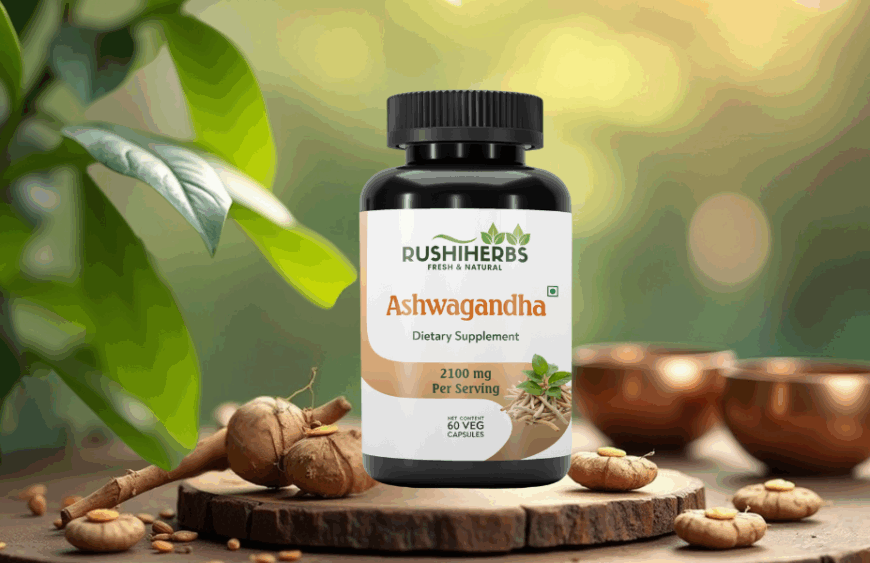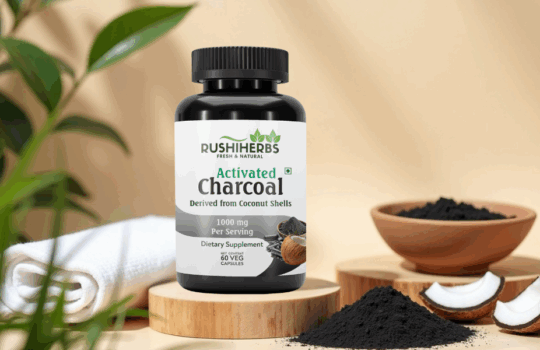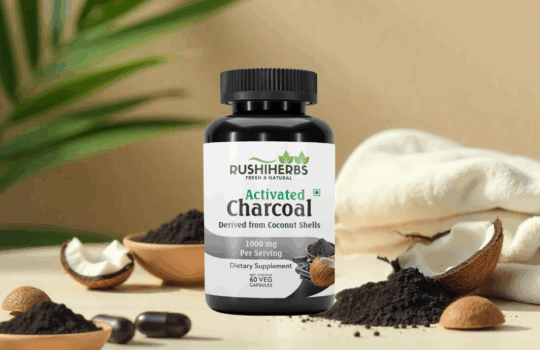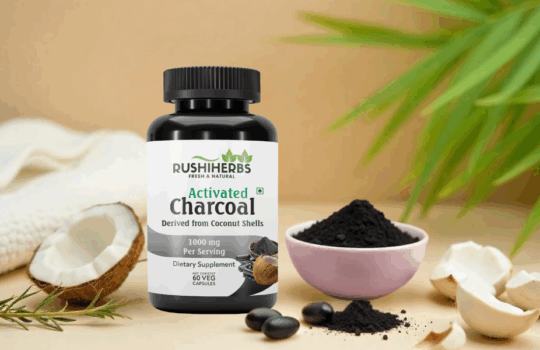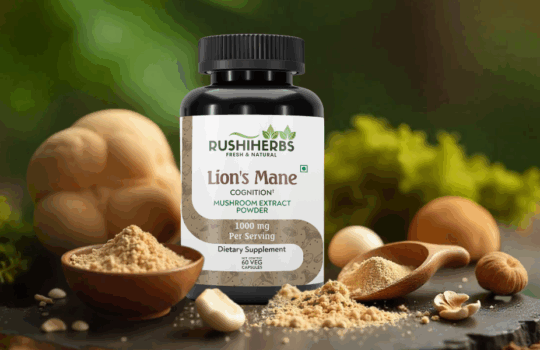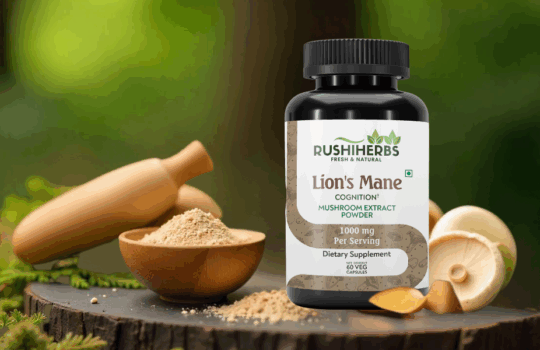Introduction
Hormones influence nearly every function in the human body—from metabolism and mood to sleep, reproduction, and immunity. But when hormones become imbalanced, the impact can be felt deeply. Fatigue, weight gain, infertility, anxiety, low libido, and irregular cycles are just a few signs that your endocrine system may be off-kilter.
The good news? Nature offers solutions. One of the most studied herbs in Ayurvedic medicine for hormonal regulation is Ashwagandha (Withania somnifera). Often referred to as “Indian Ginseng,” Ashwagandha is an adaptogen—helping the body restore equilibrium under stress and hormonal dysfunction.
In this in-depth article, we’ll explore how Rushi Herbs Ashwagandha – 2100 mg may support hormonal balance and reproductive health in both men and women. We’ll also dive into the latest scientific research backing its benefits, and how you can incorporate this powerful root into your wellness routine.
What Is Ashwagandha and How Does It Work?
Ashwagandha is a time-honored adaptogenic herb used in Ayurveda for over 3,000 years. Its root and leaves contain bioactive compounds like withanolides, alkaloids, and sitoindosides. These constituents are known to support:
- Adrenal and thyroid health
- Sex hormone balance
- Stress resilience (via cortisol regulation)
- Reproductive vitality
- Mood and cognitive function
As an adaptogen, Ashwagandha doesn’t stimulate or suppress—it modulates. It helps restore hormonal homeostasis, allowing your body to return to a state of natural balance without harsh interference.
The Endocrine System and Hormone Imbalance: A Growing Concern
Our hormonal system is sensitive to internal and external stressors. Poor sleep, chronic stress, processed diets, environmental toxins, and sedentary lifestyles all contribute to dysfunction.
Common Signs of Hormonal Imbalance Include:
- Fatigue and brain fog
- Anxiety, irritability, or mood swings
- Irregular or painful menstrual cycles
- Low libido or erectile dysfunction
- Infertility (in both men and women)
- Weight gain or difficulty losing weight
- Hair loss or thinning
- Insomnia or poor sleep quality
Conventional treatment may include synthetic hormone therapy, but these solutions often come with side effects. Natural alternatives like Ashwagandha provide a holistic, well-tolerated approach to hormonal health.
Benefits of Ashwagandha for Men: Testosterone, Fertility & Vitality
Ashwagandha has been shown in several studies to boost testosterone, sperm quality, and male reproductive health. It works by supporting the hypothalamic-pituitary-gonadal (HPG) axis, which governs hormone production and regulation.
1. Increases Testosterone Naturally
A randomized, double-blind, placebo-controlled study (Lopresti et al., 2019) found that men taking Ashwagandha for 8 weeks had significantly higher testosterone levels compared to placebo.
Ashwagandha works by:
- Reducing cortisol (which suppresses testosterone)
- Supporting Leydig cell function in the testes
- Improving blood flow and oxidative balance
2. Improves Sperm Count and Motility
A 2013 study published in Fertility and Sterility evaluated 75 infertile men. After three months of Ashwagandha supplementation, researchers observed:
- A 167% increase in sperm count
- A 53% increase in semen volume
- A 57% improvement in sperm motility
These fertility-boosting effects were linked to reduced oxidative stress and improved hormone regulation.
3. Enhances Libido and Sexual Function
By increasing testosterone and reducing stress-related fatigue, Ashwagandha is also known to enhance:
- Sexual desire (libido)
- Erectile strength
- Endurance and confidence
Benefits of Ashwagandha for Women: PCOS, Thyroid, and Hormonal Harmony
Hormonal imbalance is a growing concern among women, particularly due to conditions like PCOS, thyroid dysfunction, PMS, and perimenopause. Ashwagandha addresses the root causes by restoring adrenal and thyroid balance while easing nervous system tension.
1. Supports PCOS Symptom Relief
Polycystic ovary syndrome (PCOS) is characterized by:
- Irregular cycles
- Androgen (male hormone) dominance
- Insulin resistance
- Mood swings and weight gain
Ashwagandha’s ability to lower cortisol and balance insulin makes it a promising supplement for PCOS sufferers.
In a 2020 pilot study, women with PCOS who took Ashwagandha saw improvements in:
- Cycle regularity
- Weight management
- Stress-related symptoms
2. Balances Estrogen and Progesterone Naturally
Ashwagandha influences the hypothalamic-pituitary-ovarian (HPO) axis, which regulates estrogen and progesterone. This helps manage:
- PMS symptoms
- Perimenopausal transitions
- Menstrual pain and irregularities
By reducing cortisol, Ashwagandha allows the body to prioritize reproductive hormone production.
3. Thyroid Support for Hypothyroidism
Many women experience hypothyroidism, leading to fatigue, cold sensitivity, and weight gain. Ashwagandha has been shown to improve T3 and T4 levels in those with subclinical hypothyroidism.
One 2018 study published in Journal of Alternative and Complementary Medicine found that Ashwagandha significantly improved thyroid hormone levels over 8 weeks.
Adrenal Health: The Root of Hormonal Resilience
Your adrenal glands are responsible for producing cortisol and DHEA—both key hormones in energy, mood, and reproductive health. Chronic stress exhausts the adrenals, leading to:
- Low libido
- Irregular periods
- Poor stress response
- Sleep issues
Ashwagandha helps by:
- Reducing cortisol levels
- Supporting HPA axis function
- Enhancing stress tolerance and calmness
When the adrenals are balanced, other hormones begin to stabilize too.
Mood and Hormones: The Mind-Body Connection
Hormonal imbalances often trigger mood changes—like irritability, depression, or anxiety. Ashwagandha supports emotional wellness through:
- Regulation of cortisol and adrenaline
- Balancing GABA and serotonin pathways
- Improving resilience to emotional stress
This is particularly beneficial during PMS, menopause, and adrenal fatigue, where hormones and neurotransmitters are closely linked.
Scientific Evidence: What Research Says About Ashwagandha and Hormones
Here’s a summary of major studies highlighting Ashwagandha’s hormone-supporting properties:
| Study | Participants | Outcome |
|---|---|---|
| Raut et al., 2012 | 64 men | Increased testosterone and muscle mass |
| Choudhary et al., 2018 | 50 PCOS women | Improved stress, cycles, and mood |
| Lopresti et al., 2019 | 57 males | Boosted testosterone and vitality |
| Sharma et al., 2018 | Hypothyroid patients | Improved T3/T4 levels and mood |
| Singh et al., 2020 | Both genders | Lowered cortisol and improved fertility markers |
These clinical trials validate Ashwagandha’s powerful effects on multiple hormonal pathways.
Why Choose Rushi Herbs Ashwagandha – 2100 mg?
Not all Ashwagandha supplements are created equal. Rushi Herbs Ashwagandha stands out due to:
- High potency: 2100 mg per serving for therapeutic benefits
- Vegan and non-GMO: Clean and pure formulation
- Standardized extract: High levels of active withanolides
- Third-party tested: For quality, purity, and safety
- Convenient capsules: Easy to incorporate into daily routine
This premium supplement is ideal for anyone looking to support hormonal and reproductive wellness naturally.
How to Take Ashwagandha for Hormonal Support
Suggested Use:
- Dosage: 2100 mg daily (as directed on Rushi Herbs’ label)
- Timing: Morning or early evening with meals
- Consistency: Take daily for 8–12 weeks for best results
- Cycle Off: 1 week break every 3 months recommended
Tips for Maximum Effect:
- Pair with healthy fats (like coconut oil or ghee) for better absorption
- Combine with zinc, magnesium, or vitamin D for enhanced hormonal effects
- Manage lifestyle: good sleep, hydration, and whole foods amplify Ashwagandha’s impact
Who Should Avoid or Use With Caution?
Ashwagandha is generally safe, but some individuals should use it with care:
- Pregnant or breastfeeding women (consult your doctor)
- People on thyroid medication (may require dosage adjustment)
- Those with autoimmune conditions
Always consult a healthcare professional before starting a new supplement, especially if you are on medications or have chronic health conditions.
Final Thoughts: A Holistic Herb for Hormonal Health
Hormonal imbalances can make daily life feel like an uphill battle. Whether you’re struggling with stress-induced low testosterone, PCOS, thyroid issues, or mood fluctuations, Ashwagandha offers a natural and proven path to harmony.
With its adaptogenic magic and deep endocrine support, Rushi Herbs Ashwagandha – 2100 mg can be a powerful ally in your journey toward better energy, balanced cycles, enhanced fertility, and vibrant well-being.
Improve Reproduction System
Choose Rushi Herbs Ashwagandha Capsules – 2400 mg Today.
Frequently Asked Questions (FAQs)
1. Can Ashwagandha help with hormonal imbalance in both men and women?
Yes. Ashwagandha is an adaptogenic herb that helps regulate the endocrine system. In men, it supports testosterone and fertility, while in women, it helps balance estrogen, progesterone, and improve symptoms of PCOS and thyroid disorders.
2. How does Ashwagandha affect testosterone levels?
Ashwagandha helps increase testosterone levels by reducing cortisol, improving testicular function, and boosting antioxidant activity. Clinical studies have shown significant increases in testosterone in men taking Ashwagandha for 8–12 weeks.
3. Is Ashwagandha good for PCOS?
Yes. Ashwagandha can help manage PCOS symptoms by reducing cortisol and insulin resistance—both of which are key contributors to PCOS. It also supports menstrual cycle regularity and mood stabilization.
4. Can Ashwagandha help with thyroid problems?
Ashwagandha may support thyroid function, especially in cases of subclinical hypothyroidism. It helps regulate TSH, T3, and T4 levels, promoting a healthy metabolism and improved energy levels.
5. Does Ashwagandha improve fertility?
Ashwagandha has been shown to improve sperm count, motility, and semen volume in men. In women, it supports hormonal balance and cycle regularity—key factors for fertility.
6. When is the best time to take Ashwagandha for hormonal balance?
The best time to take Ashwagandha is in the morning or early evening with food. Consistent daily use is key for hormonal balance. Avoid taking it right before bed if it gives you energy, though for some it improves sleep.
7. Are there any side effects of Ashwagandha for hormonal health?
Ashwagandha is generally well-tolerated. Mild side effects may include digestive upset or drowsiness in sensitive individuals. Pregnant or breastfeeding women and people on thyroid medication should consult a doctor before use.
8. How long does it take to see results with Rushi Herbs Ashwagandha – 2100 mg?
Most people begin to notice improvements in energy, mood, and hormonal symptoms within 4–6 weeks of consistent use. For full hormonal and reproductive benefits, a course of 8–12 weeks is recommended.

